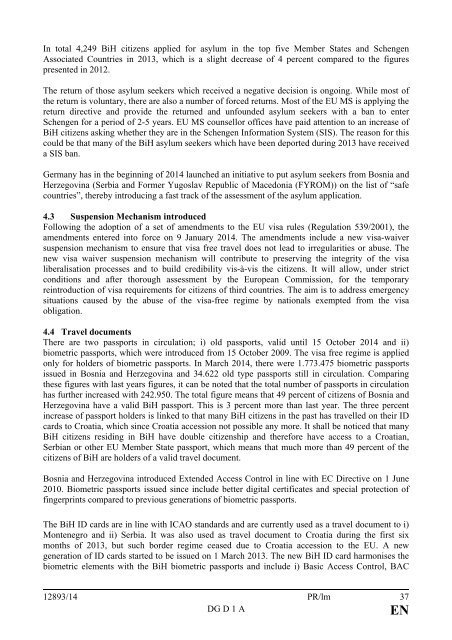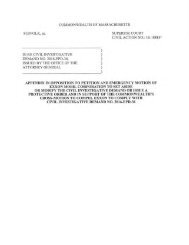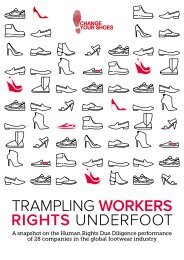eu-com-schengen-coop
eu-com-schengen-coop
eu-com-schengen-coop
Create successful ePaper yourself
Turn your PDF publications into a flip-book with our unique Google optimized e-Paper software.
In total 4,249 BiH citizens applied for asylum in the top five Member States and Schengen<br />
Associated Countries in 2013, which is a slight decrease of 4 percent <strong>com</strong>pared to the figures<br />
presented in 2012.<br />
The return of those asylum seekers which received a negative decision is ongoing. While most of<br />
the return is voluntary, there are also a number of forced returns. Most of the EU MS is applying the<br />
return directive and provide the returned and unfounded asylum seekers with a ban to enter<br />
Schengen for a period of 2-5 years. EU MS counsellor offices have paid attention to an increase of<br />
BiH citizens asking whether they are in the Schengen Information System (SIS). The reason for this<br />
could be that many of the BiH asylum seekers which have been deported during 2013 have received<br />
a SIS ban.<br />
Germany has in the beginning of 2014 launched an initiative to put asylum seekers from Bosnia and<br />
Herzegovina (Serbia and Former Yugoslav Republic of Macedonia (FYROM)) on the list of “safe<br />
countries”, thereby introducing a fast track of the assessment of the asylum application.<br />
4.3 Suspension Mechanism introduced<br />
Following the adoption of a set of amendments to the EU visa rules (Regulation 539/2001), the<br />
amendments entered into force on 9 January 2014. The amendments include a new visa-waiver<br />
suspension mechanism to ensure that visa free travel does not lead to irregularities or abuse. The<br />
new visa waiver suspension mechanism will contribute to preserving the integrity of the visa<br />
liberalisation processes and to build credibility vis-à-vis the citizens. It will allow, under strict<br />
conditions and after thorough assessment by the European Commission, for the temporary<br />
reintroduction of visa requirements for citizens of third countries. The aim is to address emergency<br />
situations caused by the abuse of the visa-free regime by nationals exempted from the visa<br />
obligation.<br />
4.4 Travel documents<br />
There are two passports in circulation; i) old passports, valid until 15 October 2014 and ii)<br />
biometric passports, which were introduced from 15 October 2009. The visa free regime is applied<br />
only for holders of biometric passports. In March 2014, there were 1.773.475 biometric passports<br />
issued in Bosnia and Herzegovina and 34.622 old type passports still in circulation. Comparing<br />
these figures with last years figures, it can be noted that the total number of passports in circulation<br />
has further increased with 242.950. The total figure means that 49 percent of citizens of Bosnia and<br />
Herzegovina have a valid BiH passport. This is 3 percent more than last year. The three percent<br />
increase of passport holders is linked to that many BiH citizens in the past has travelled on their ID<br />
cards to Croatia, which since Croatia accession not possible any more. It shall be noticed that many<br />
BiH citizens residing in BiH have double citizenship and therefore have access to a Croatian,<br />
Serbian or other EU Member State passport, which means that much more than 49 percent of the<br />
citizens of BiH are holders of a valid travel document.<br />
Bosnia and Herzegovina introduced Extended Access Control in line with EC Directive on 1 June<br />
2010. Biometric passports issued since include better digital certificates and special protection of<br />
fingerprints <strong>com</strong>pared to previous generations of biometric passports.<br />
The BiH ID cards are in line with ICAO standards and are currently used as a travel document to i)<br />
Montenegro and ii) Serbia. It was also used as travel document to Croatia during the first six<br />
months of 2013, but such border regime ceased due to Croatia accession to the EU. A new<br />
generation of ID cards started to be issued on 1 March 2013. The new BiH ID card harmonises the<br />
biometric elements with the BiH biometric passports and include i) Basic Access Control, BAC<br />
12893/14 PR/lm 37<br />
DG D 1 A<br />
EN












